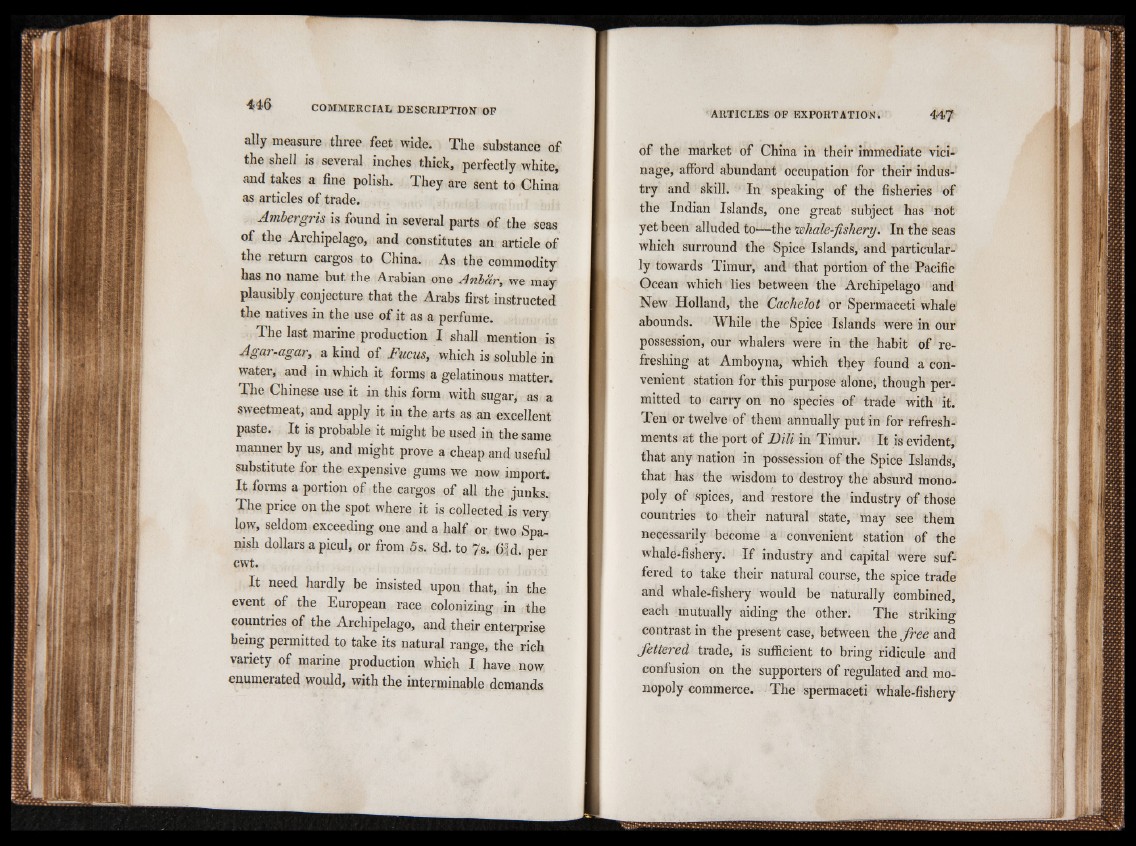
ally measure three feet wide. The substance of
the shell is several inches thick, perfectly white,
and takes a fine polish. They are sent to China
as articles of trade.
Ambergris is found in several parts of the seas
of the Archipelago, and constitutes an article of
the return cargos to China. As the commodity
has no name but the Arabian one Anbdr, we may
plausibly conjecture that the Arabs first instructed
the natives in the use of it as a perfume.
The last marine production I shall mention is
Agar-agar, a kind of Fucus, which is soluble in
water, and in which it forms a gelatinous matter.
The Chinese use it in this form with sugar, as a
sweetmeat, and apply it in the arts as an excellent
paste. It is probable it might be used in the same
manner by us, and might prove a cheap and useful
substitute for the expensive gums we now import.
It forms a portion of the cargos of all the junks.
The price on the spot where it is collected is very
low, seldom exceeding one and a half or two Spanish
dollars a picul, or from 5s. 8d. to 7«. 6jd. per
cwt.
It need hardly be insisted upon that, in the
event of the European race colonizing in the
countries of the Archipelago, and their enterprise
being permitted to take its natural range, the rich
variety of marine production which I have now
enumerated would, with the interminable demands
of the market of China in their immediate vicinage,
afford abundant occupation for their industry
and skill. In speaking of the fisheries of
the Indian Islands, one great subject has not
yet been alluded to—the whale-fishery. In the seas
which surround the Spice Islands, and particularly
towards Timur, and that portion of the Pacific
Ocean which lies between the Archipelago and
New Holland, the Cachelot or Spermaceti whale
abounds. While the Spice Islands were in our
possession, our whalers were in the habit of refreshing
at Amboyna, which they found a convenient
station for this purpose alone, though permitted
to carry on no species of trade with it.
Ten or twelve of them annually put in for refreshments
at the port of Dili in Timur. It is evident,
that any nation in possession of the Spice Islands,
that has the wisdom to destroy the absurd monopoly
of spices, and restore the industry of those
countries to their natural state, may see them
necessarily become a convenient station of the
whale-fishery. If industry and capital w7ere suffered
to take their natural course, the spice trade
and whale-fishery would be naturally combined,
each mutually aiding the other. The striking
contrast in the present case, between the free and
fettered trade, is sufficient to bring ridicule and
confusion on the supporters of regulated and monopoly
commerce. The spermaceti whale-fishery